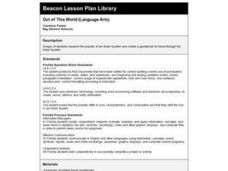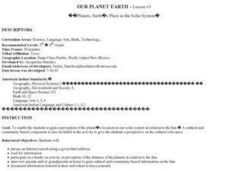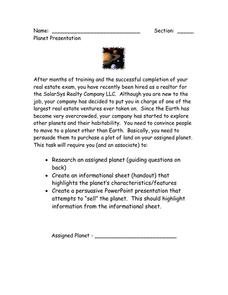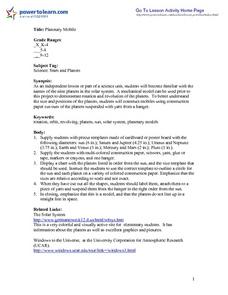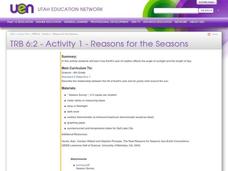American Museum of Natural History
Field Trip: Space Flight
Take a virtual trip to infinity and beyond. Pupils watch a space visualization that leaves Earth and heads to the ISS and then follows the Apollo missions to the moon. Scholars view detailed images of the space station and its different...
Curated OER
The Path of the Sun: The Ecliptic
Students investigate the celestial sphere and the paths it takes in the solar system.
Curated OER
Kepler's Third Law
Students use Kepler's third law to derive the velocity in a circular orbit of any radius, and identify the Earth escape velocity.
Curated OER
Outer Space and Beyond
Students compare and contrast the size, characteristics, composition, and orbits of the planets in our Solar System. They view a PowerPoint presentation, and in small groups conduct Internet research on a selected planet. Each group...
Curated OER
How Can a Spacecraft Always Face the Sun?
Students determine the correct orbital path for a satellite that collects data about the sun so that its view of the sun never be obstructed by the Earth.
Curated OER
Out of This World (Language Arts)
Second graders, in groups, research the planets in the solar system and create a guidebook for travel.
Curated OER
"Space" Investigations
Sixth graders understand the patterns of change observable on Earth as a result of the movement of the different bodies in the solar system. They identify the physical characteristics of the different components of the solar system.
Curated OER
Moon Journal
Students review the planets and major moons in the Solar System. In groups, they research and describe the various phases of the moon. They record their observations of the moon phases over a specific period of time and use the...
Curated OER
History of Astronomy
Students participate in assessments regarding the history of astronomy. They listen and take notes, draw a time line, draw a solar sytem designed by Ptolemy and create flashcards. They write an essay on Galileo, watch a video, take a...
Curated OER
Planetary Poster
Students engage in a study about the planets and create a poster as one of the projects during the study. They create individual charts for mapping the solar system so the locations can be found in mock space missions to other planets.
Curated OER
Is There a Tenth Planet?
In this planets worksheet, learners read about how our solar system's planets were discovered and how scientist believe there might be a tenth planet. After reading, students complete 4 short answer questions.
Curated OER
Day and Night
Fifth graders investigate the Earth's rotation and revolution and the moon's orbit around the Earth. They participate in a class discussion about how night and day occur, and take notes. Next, they watch a video about the solar system...
Curated OER
Solar System Planet Research
In this space science worksheet, students collect data that includes information in a chart or graph to display in a group. They identify and describe various planet features of a specific planet of choice. Students write notes and the...
Curated OER
Solar System
In this Solar System worksheet, 5th graders demonstrate knowledge of parts of the Solar System. Students unscramble letters to list these parts.
Curated OER
Earth's Place in the Solar System
Students study and discuss the planets. They create a visual representation of the layout of the solar system and color it. They also write an informative/narrative summary report on the cultural relevance of the Sun.
Curated OER
Our Solar System to Scale
Middle schoolers calculate the diameter of planets and their relative distances. In this space science lesson, students discover how small or big the planets are in comparison to each other. Middle schoolers use cross multiplying...
Curated OER
The Planets in our Solar System
In this solar system worksheet, students will write in the nine planets that are found orbiting around our sun in our solar system.
NASA
Things Are Not Always What They Seem
Science is magic that works. Magical color-changing beads and a coffee can that follows voice commands are just two examples of magic tricks that rely on science. After completing a hands-on activity and an experiment investigating the...
Curated OER
Seasons and Cloud Cover, Are They Related?
Students use NASA satellite data to correlate cloud cover over Africa to the solar declination.
Curated OER
Earth, Sun and Moon
Students explore, experiment and study how the Earth orbits the Sun once a year and how the moon takes approximately 29 days to orbit the Earth. They access an online activity to examine the process of how the Sun is at the center of the...
Mr. Jones's Science Class
Planet Presentation
Upper-elementary astronomers take on the role of interplanetary real estate salesmen. They research an assigned planet and create a PowerPoint to persuade the rest of the class to purchase property and move there. This fun project would...
Curated OER
Planetary Mobile
Students receive pre-cut templates of cardboard with appropriate diameters of each planet and the sun. They use multi-colored construction paper, scissors, yarn, and other art supplies to create their own models of planets. When students...
Curated OER
Reasons for the Seasons
Sixth graders conduct and analyze a survey that explores public perceptions about the reasons for seasonal change. They measure the changing length of days, observe shadows and discuss how the Earth's axis of rotation affects the seasons.
Curated OER
Astronomical Data
For this astronomy worksheet, students use a chart with planetary data comparing the inner planets to each other. Students will use the period of rotation, period of revolution, and distance from the sun for these inner planets to...







